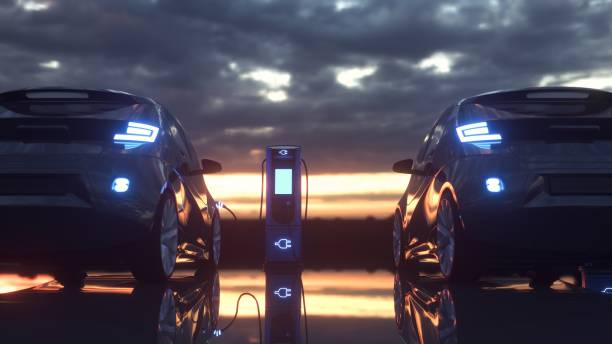The Benefits of Electric Vehicles: Driving Towards a Greener Future
This post contains affiliate links. This means I will make a commission at no extra cost to you should you click through and make a purchase. Read the full disclosure here.
The world is facing a pressing challenge in the form of climate change and environmental degradation. As the negative impacts of traditional fossil fuel-powered vehicles become increasingly evident, the need for sustainable transportation solutions has become paramount. Electric vehicles (EVs) have emerged as a promising alternative, offering numerous benefits that contribute to a greener future.
Table of Contents
Environmental Benefits
Electric vehicles are hailed for their significant environmental advantages. By running on electricity instead of fossil fuels, EVs produce zero tailpipe emissions, reducing greenhouse gas emissions and improving air quality. This shift to cleaner energy sources plays a crucial role in mitigating climate change and combating air pollution.
Cost Savings
While the initial cost of purchasing an electric vehicle may be higher compared to conventional cars, EV owners can enjoy substantial cost savings in the long run. Electric vehicles have lower operating costs due to the lower price of electricity compared to gasoline or diesel. EVs also require less frequent maintenance, as they have fewer moving parts and don’t need oil changes.
Energy Efficiency

Electric vehicles are more energy-efficient than their internal combustion engine counterparts. Traditional vehicles convert only about 20% of the energy from gasoline into actual power, while EVs can convert around 80% of the electrical energy into propulsion. This higher efficiency leads to better mileage, reducing energy consumption and the overall carbon footprint.
Reduced Dependence on Fossil Fuels
By embracing electric vehicles, we can reduce our dependence on fossil fuels and decrease the demand for oil. This shift has significant geopolitical implications, as countries can become more self-reliant in meeting their energy needs and reduce vulnerability to oil price fluctuations. Increasing the share of renewable energy sources in the electricity grid further enhances the sustainability of EVs.
Government Incentives
Many governments worldwide have recognized the importance of transitioning to electric vehicles and have implemented various incentives to promote their adoption. These incentives can include tax credits, rebates, grants, and subsidies. Such government support not only helps reduce the upfront cost of purchasing an electric vehicle but also encourages the development of charging infrastructure.
Improved Air Quality
One of the immediate benefits of electric vehicles is the positive impact they have on air quality. Traditional vehicles emit pollutants such as nitrogen oxides, carbon monoxide, and particulate matter, contributing to poor air quality and associated health problems. Electric vehicles produce zero tailpipe emissions, reducing harmful pollutants and improving the overall air quality in urban areas.
Noise Reduction
In addition to the environmental benefits, electric vehicles offer a quieter and more peaceful driving experience. Unlike traditional vehicles with internal combustion engines, electric vehicles operate silently. This reduction in noise pollution can have a significant impact, particularly in densely populated areas and during nighttime driving, providing a more comfortable and serene environment.
Health Benefits
The transition to electric vehicles brings significant health benefits to both individuals and communities. By reducing air pollution and emissions, EVs help lower the incidence of respiratory diseases, cardiovascular problems, and other health issues associated with poor air quality. Moreover, the quieter operation of electric vehicles can help mitigate noise-related stress and its detrimental effects on mental health.
Advances in Technology
The rapid advancements in electric vehicle technology have fueled their widespread adoption. Battery technology has improved, enabling longer driving ranges and faster charging times. The development of regenerative braking systems and energy-recuperation technologies further enhances the efficiency of electric vehicles. Continuous research and innovation in this field promise exciting possibilities for the future of electric transportation.
Charging Infrastructure
To facilitate the widespread use of electric vehicles, a robust and accessible charging infrastructure is crucial. Governments, businesses, and communities are investing in the installation of charging stations, both public and private. Rapid charging stations and advancements in wireless charging technology are expanding the convenience and practicality of electric vehicles, eliminating range anxiety for EV owners.
Long-Term Sustainability
Electric vehicles contribute to long-term sustainability by conserving natural resources and reducing the carbon footprint. As renewable energy sources become more prevalent, the environmental benefits of EVs multiply. Additionally, the recycling and repurposing of EV batteries ensure that their life cycle is managed sustainably, minimizing waste and promoting circular economy practices.
The Future of Electric Vehicles
The future of electric vehicles looks promising as technology continues to advance and economies of scale bring down costs. Increasing investments in research and development is expected to lead to further improvements in battery capacity, charging speed, and overall vehicle performance. With the ongoing transition to renewable energy sources, electric vehicles are poised to become the norm in the automotive industry.
Final Thoughts
Electric vehicles offer a multitude of benefits that extend far beyond personal transportation. From environmental and health advantages to cost savings and energy efficiency, EVs are driving us toward a greener future. With the collective efforts of individuals, businesses, and governments, the adoption of electric vehicles can play a vital role in mitigating climate change and preserving our planet for future generations.
FAQs About Electric Vehicles
Are electric vehicles more expensive than traditional cars?
Electric vehicles often have a higher upfront cost, but they can provide long-term savings through lower operating and maintenance costs.
How far can electric vehicles travel on a single charge?
The driving range of electric vehicles varies depending on the model and battery capacity. Modern electric cars typically offer ranges between 150 and 300 miles, with some high-end models surpassing 400 miles.
How long does it take to charge an electric vehicle?
Charging times for electric vehicles depend on the charging infrastructure and the vehicle’s battery capacity. With fast-charging stations, it’s possible to achieve an 80% charge in 30 minutes or less.
Where can I charge my electric vehicle?
Charging options for electric vehicles include home charging stations, workplace charging facilities, and public charging stations. The availability of charging stations is rapidly expanding, with many public spaces, parking lots, and shopping centers providing charging facilities.
Are electric vehicles truly environmentally friendly?
Electric vehicles produce zero tailpipe emissions, making them significantly more environmentally friendly than traditional gasoline or diesel vehicles. However, the overall environmental impact also depends on the sources of electricity used for charging, which can include renewable or non-renewable energy. Transitioning to renewable energy sources further enhances the environmental benefits of electric vehicles.














